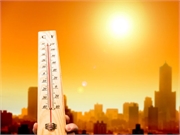- Could Your Grocery Store Meat Be Causing Recurring UTIs?
- Are You Making This Expensive Thermostat Error This Winter?
- Recognizing the Signs of Hypothyroidism
- 10 Strategies to Overcome Insomnia
- Could Artificial Sweeteners Be Aging the Brain Faster?
- Techniques for Soothing Your Nervous System
- Does the Water in Your House Smell Funny? Here’s Why
- Can a Daily Dose of Apple Cider Vinegar Actually Aid Weight Loss?
- 6 Health Beverages That Can Actually Spike Your Blood Sugar
- Treatment Options for Social Anxiety Disorder
Global Warming Could Trigger Even More Extreme Weather Than Thought

Using past weather data to predict climate change-linked increases in extreme weather events may underestimate how often they’ll occur, with potentially serious consequences, a Stanford University study says.
It found that predictions based solely on historical records underestimated by about half the actual number of extremely hot days in Europe and East Asia, as well as the number of extremely wet days in the United States, Europe and East Asia between 2006 and 2017.
In some cases, the actual number of extreme events was much larger than predicted, said climate scientist Noah Diffenbaugh. He’s a senior fellow at Stanford’s Woods Institute for the Environment.
“When I first looked at the results, I had this sinking feeling that our method for analyzing these extreme events could be all wrong,” Diffenbaugh said in a university news release. “As it turned out, the method actually worked very well for the period that we had originally analyzed — it’s just that global warming has had a really strong effect over the last decade.”
The findings — published March 18 in the journal Science Advances — highlight how even slight increases in global warming can cause large increases in the risk of extreme weather events, particularly heat waves and heavy rainfall.
“We are seeing year after year how the rising incidence of extreme events is causing significant impacts on people and ecosystems,” Diffenbaugh said.
“One of the main challenges in becoming more resilient to these extremes is accurately predicting how the global warming that’s already happened has changed the odds of events that fall outside of our historical experience,” he added.
The study reviewed whether predictions made using 1961-2005 data on extreme weather events matched actual events between 2006 and 2017.
It identified the potential for new techniques that rely on both historical observations and climate models. However, climate models still contain important uncertainties, Diffenbaugh said.
“The good news is that these new results identify some real potential to help policymakers, engineers and others who manage risk to integrate the effects of global warming into their decisions,” he said.
More information
The Center for Climate and Energy Solutions has more on extreme weather and climate change.
Source: HealthDay
Copyright © 2026 HealthDay. All rights reserved.










